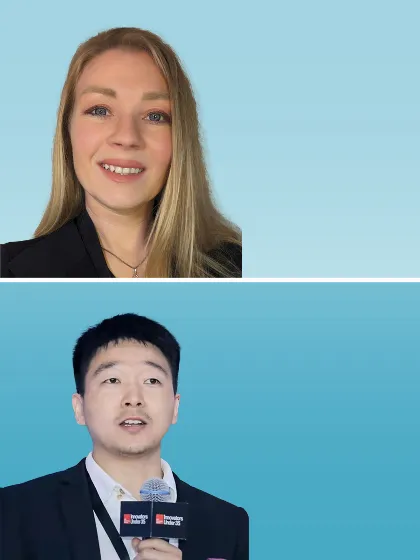EES Lectureship
Recognising emerging investigators from the field of energy research.
Details
| Status | Closed |
|---|---|
| Nominations closing date | 01 July 2025 |
| Nominator eligibility | Anyone |
| Nominee location | Global |
| Career stage | Early career |
About this lectureship
This Lectureship recognises an outstanding emerging investigator working in an energy research topic within the scope of Energy and Environmental Science, providing a platform to showcase their research to the wider scientific community. The EES Lectureship is awarded annually through a process whereby nominations of candidates are invited from our fantastic community. The winner:
- receives a £1,000 honorarium
- is given the opportunity to attend and present their research at a leading international conference (in the event this is not possible, for example, due to travel restrictions, the presentation will be online)
Winners

Hanna Breunig and Dongliang Chao
For outstanding emerging investigators working in an energy research topic within the scope of the journal Energy and Environmental Science.
Previous winners
- 2022: Juan-Pablo Correa-Baena, Georgia Institute of Technology, USA and Hans-Georg Steinrück, Paderborn University, Germany
- 2021: Samuel Stranks, University of Cambridge, UK
- 2020: Yana Vaynzof, Technical University of Dresden, Germany and Wooyul Kim, Sookmyung Women’s University, South Korea
- 2019: Maria Lukatskaya, ETH Zürich, Switzerland
- 2018: Guo-liang Chai, Fujian Institute of Research on the Structure of Matter (FJIRSM) & Chinese Academy of Sciences (CAS), China
- 2017: David X. W. Lou, National University of Singapore, Singapore
- 2016: Wolfgang Tress, EPFL, Switzerland
- 2015: Miguel Modestino, EPFL, Switzerland
- 2013: Tom Jaramillo, Stanford University, USA
- 2012: Kisuk Kang, Seoul National University, South Korea
Guidelines for nominators and candidates
Find out who is eligible for this lectureship, about the nomination process and see who is on the selection panel.
Since 2019, the EES Lectureship has been awarded through a process whereby nominations of candidates are invited from our community. As part of the Royal Society of Chemistry, we believe we have a responsibility to promote inclusivity and accessibility to improve diversity. Where possible, we encourage each nominator to consider nominating candidates of all genders, races, and backgrounds.
To be eligible for the EES Lectureship, the candidate must:
- Have completed their PhD
- Have published in EES in the past 3 years
- Be working in a research area within the scope of Energy & Environmental Science
- Be at an early stage of their independent career (typically this will be within 11 years of completing their PhD, but appropriate consideration will be given to those who have taken a career break or followed a different study path)
Nominations are now open until 1 June 2025 for the 2025 EES Lectureship.
Nominations can be made by anyone (with the exception of members of the selection panel) and must be sent via email. Self-nominations are not permitted.
To nominate a candidate, please provide:
- A completed EES Lectureship nomination form
- A brief letter of recommendation
- An additional supporting letter of recommendation from an independent referee, with detailed comments on the specific contributions, achievements, or potential of the nominee
- A nominee curriculum vitae, including a complete list of publications and invited or plenary talks given
Consideration is given to all information provided in the letters of recommendation, candidate CV and nomination form. The winner of the EES Lectureship is selected by a panel of Editorial Board members, including the Editorial Board Chair and Executive Editor.